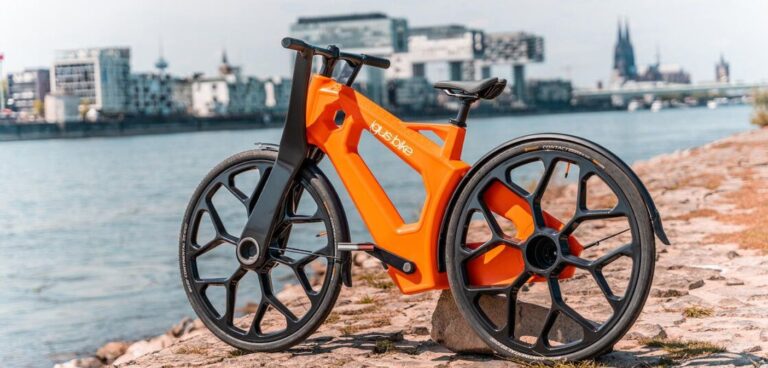Igus has unveiled the world’s first urban bicycle made from recycled plastic and will make the concept and components available to all bicycle manufacturers.
The recycled version of igus:bike is made from plastics classified as single use. Plastic components on the bike include the frame, bearings and toothed belt.
“The plastic in rubbish dumps around the world is becoming a valuable resource,” said Frank Blase, Igus CEO, who developed the idea for the igus:bike after talking to employees of a bicycle rental company during a vacation.
He discovered that the bikes were continuously exposed to sand, wind and saltwater and sometimes only lasted three months before they had to be replaced. “As all components are made of plastic, no part of the bike rusts, even the gears – bicycle gears made of plastic were unthinkable for a long time,” said Blase.
According to Igus, lightweight, lubrication-free high-performance plastics are used in all parts of the bicycle, from two-component ball bearings in the wheel bearings to plain bearings in the seat post, brake levers and pedals. All of these components have integrated solid lubricants and ensure low-friction dry operation.
Eight developers at Igus are currently working on all moving components of the all-plastic bicycle. Ball bearings, brakes, sprockets, gears and drives are being coordinated by Andreas Hermey, development manager for energy chains, in cooperation with MTRL, a bicycle start-up in the Netherlands.
MTRL, which is planning manufacturing facilities near plastic landfill sites, will begin production and sale of a children’s model and an adult bicycle for cities by the end of the year. Other versions, including an e-bike, are planned.
In future, the all-plastic bicycle is to be available in a variant made of new plastic and one made entirely of recycled material. The adult bike made of virgin plastic will cost €1,200 (£1,022) with a €200 (£170) surcharge applicable for the recycled-plastic variant.
The new igus:bike platform offers bicycle manufacturers globally the opportunity to jointly advance this technology.
“We want to enable the bicycle industry to produce plastic bikes,” said Blase. The platform is intended to become a contact point for manufacturers who want to build a plastic bicycle and for all manufacturers of suitable components, such as plastic frames, wheels, drives, and pinions.





